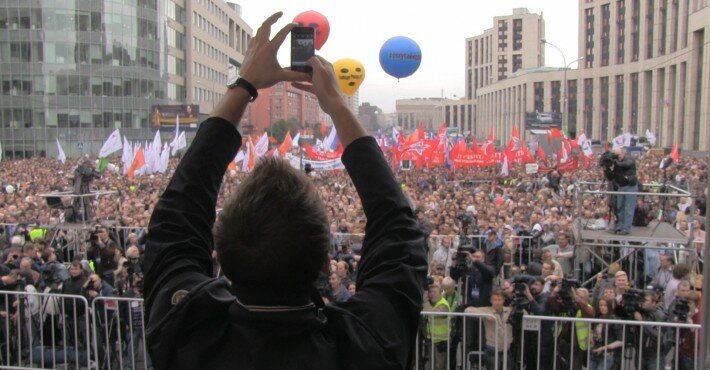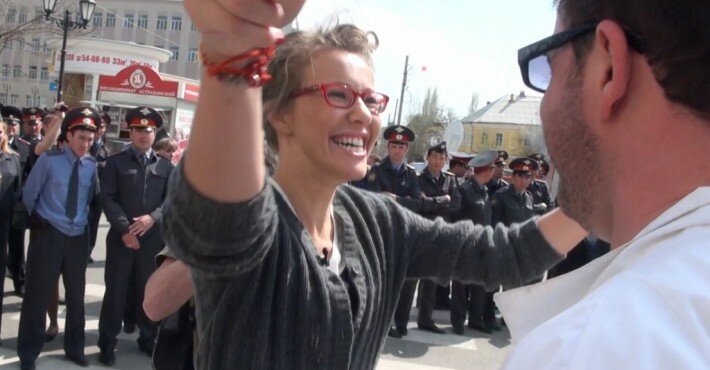Who are the leaders of the Russian opposition? In the documentary “The Term”, three filmmakers – Paweł Kostomarov, Aleksiej Pivovarov and Aleksander Rastorguyev – tried to illuminate the scene of political struggle in Russia. Unfortunately, the plot got lost in small details.

Navalny during a Protest, Source: Docs Against Gravity 2015
“The Term” followed Russian opposition, capturing its “celebrity” stars’ everyday life in close-up instead of presenting a big picture. It is not a passionate fight manifesto but a personal side of the – already institutionalized – protests against the ruler of Russia Vladimir Putin.
The documentary – shot around May 2012, when, in the eyes of its creators, a political change seemed possible – focused mainly on politicians Alexey Navalny and Ilya Yashin but also included the dazzling it-girl of Russia, Ksenia Sobchak, daughter of the former mayor of St. Petersburg.
The camera followed the protagonists during sumptuous receptions, at lunch, walks in a park and on vacation, only to return again to protest marches and courtrooms.
“The Term” tells the story of Alexey Navalny, who at that time run for mayor of Moscow and led the anti-Putin protests. Hereby, the filmmakers managed to present the problems that still exist within the opposition movement. The demonstrations caused internal difficulties at an organisational level. The leaders had a problem to hold protest marches together as police tried their best to stop and arrest them while a handful of anarchists pressured to cross the line of non-violent demonstration and start violent fights.

Sobchak excited as always , Source: Docs Against Gravity
Ksenia Sobchak, a former it-girl that is now politically engaged, was accompanied by a camera on her way of emancipation from her own father, Putin’s political mentor. It was quite interesting to listen how she talked about Putin’s character and the bubble in which he had been held by his inner circle. However, it is hard to believe in her transition into a serious political activist as she is driving around in a big Audi, handing out lip balm and flowers.
The movie documented the romance between Sobchak and Yashin with its not-happy ending. Yet in their talk they also both broached the topic of personal motivation of Navalny to candidate, and the question of whether he would bring a real change in Russian politics.
The film shows – with a lot of wit and gaiety – the lifestyle of political activists and their battles. Cleverly interweaving elements of official Russian TV materials – showing Putin paragliding, Putin in the submarine or Putin fishing – it catches its viewers in its cleverness and imaginary.
However, the core problem of the film becomes visible when we watch a short episode dealing with extremist currents present at the edge of the opposition or heard one or two nationalist comments from Navalny himself, and the story of Pussy Riot and their controversial protest in an Orthodox church.
In attempting to portray the opposition movement as vivid and exciting, the film lost itself in so many subjective impressions of playing children, distribution of flowers or an inflatable saw that the real plot was hard to track among colourful, fast moving pictures.
Although the chosen form and its innovative design probably have the potential to attract a wider audience, it remains lacking – with insufficient explanation of the reality behind those vivid pictures it only serves as a series of colourful portraits of prominent faces.
Questions like how influential the movement really is, whether a change is seriously possible or how it is seen from the outside remained unfortunately unanswered.
The movie screening was a part of the”Political Sciences” section during the “Docs against Gravity” Film Festival in Warsaw (May 2015).

